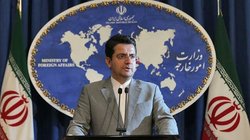 Iranian Foreign Ministry Spokesman Abbas Mousavi reacts to the United States’ detailing of what Washington claims should replace the 2015 Iran nuclear deal, saying the US-envisioned accord’s provisions reflect America’s delusions concerning the Islamic Republic.
Iranian Foreign Ministry Spokesman Abbas Mousavi reacts to the United States’ detailing of what Washington claims should replace the 2015 Iran nuclear deal, saying the US-envisioned accord’s provisions reflect America’s delusions concerning the Islamic Republic. RNA - US Special Representative for Iran Brian Hook unveiled the so-called Trump deal’s provisos in an interview with the Saudi-owned Asharq al-Awsat newspaper, which was published on Thursday.
Hook told the London-based paper that a replacement accord would “ensure that Iran has no path to a nuclear weapon,” reduce its uranium enrichment to zero, and prohibit the Islamic Republic from testing ballistic missiles.
Mousavi later tweeted in a reaction, saying, “Unveiling of so-called 'Trump Deal' by B. Hook only transpired the US' long fixated delusions dictated by their deeply embedded hubris and entitlement.”
Unveiling of so-called 'Trump Deal' by B. Hook only transpired the US' long fixated delusions dictated by their deeply embedded hubris and entitlement; good to have your Persian language advisors brief you about:
" حکایت گندم ری و خرمای بغداد! "
— S.A MOUSAVI (@SAMOUSAVI9) January 23, 2020
He also featured a Persian adage in his tweet that suggested that the US had better stop harboring grandiose ambitions concerning Iran, and advised that the White House have its Persian language advisors unscramble the saying for it.
Iran has changelessly said it stands by its inalienable right to enrich uranium as part of its peaceful nuclear energy program. It has also invariably distanced itself from any ambition to develop nuclear weapons as mandated by a religious decree issued by Leader of the Islamic Revolution Ayatollah Seyyed Ali Khamenei. Nor has the Islamic Republic ever accepted any demands to make any changes to its missile program, underlining the missile work’s defensive nature and indispensability to national security.
The International Atomic Energy Agency (IAEA), the United Nations nuclear agency, has verified non-diversion of Iran’s nuclear activities on all occasions. A so-called case investigating “possible military dimensions” of Iran’s nuclear work was also closed in 2015 following conclusion of the nuclear deal.
Under the deal, officially known as the Joint Comprehensive Plan of Action (JCPOA), the Islamic Republic even voluntarily accepted some limits on its nuclear program in exchange for sanction relief.
The US, however, has been relentlessly attacking the JCPOA under President Donald Trump. Trump has called the accord “the worst deal ever,” although, it has been ratified in the form of a UN Security Council resolution and hailed by its remaining signatories, the world body, and the European Union as a pillar of regional and international peace and security.
In 2018, Washington left the deal, restored the sanctions, and began forcing others to follow suit.
Following the US move, Tehran began a set of nuclear countermeasures in response to the US’s betrayal and refusal by the EU3 -- the UK, France, and Germany -- to keep honoring the deal by resisting the American sanctions.
The European trio even recently triggered a dispute mechanism featured in the deal and accused Iran of violating it, although, Tehran’s reprisal fits within the JCPOA’s Paragraph 36, and is reversible as soon as the rest of the deal partners go back to their commitments.
Hook, however, claimed that Tehran “has now violated the deal so many times that there isn't much left to preserve in the deal.” He also said the US was “pleased” with the move by the threesome European states, and hailed a recent suggestion by Britain’s Prime Minister Boris Johnson to jettison the JCPOA in favor of the so-called Trump deal.
847/940